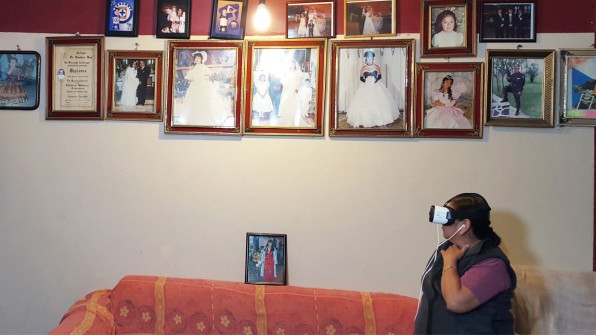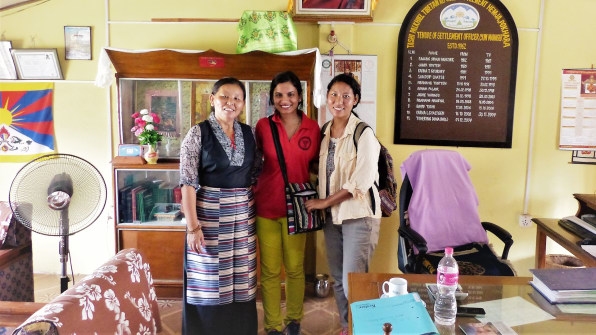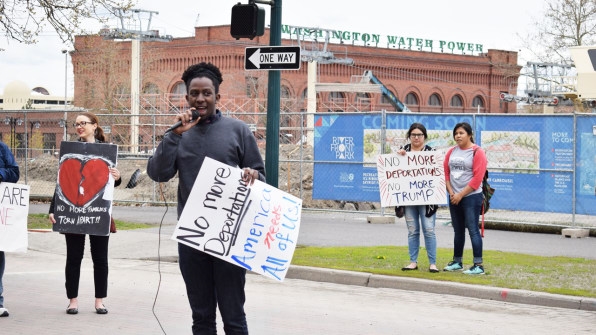Whatever Trump Decides On DACA, These Young Immigrants Will Find A Way To Keep Innovating
One year ago, Alvaro Morales quit his office job to start something that had never existed before: a creative project that reunites immigrants with their homeland and distant family via virtual reality. Morales works with co-founder Frisly Soberanis to record 360-degree videos in countries like Guatemala and El Salvador, then deliver virtual postcards to people who can’t make the trip home.
The project has won grants, and it’s work that Morales, who is originally from Peru and is undocumented, can continue regardless of the future of the Deferred Action for Childhood Arrivals program (DACA)–an Obama-era policy that prevented deportation of nearly 800,000 people who arrived in the U.S. as children and lost (or never had) legal status, and which gave Morales the right to work legally. Trump has indicated he will end, or at least seriously alter, the program in the coming days. (Update: The White House announced its decision: the program will end in six months unless Congress passes a bill, though people’s Dreamers permits will remain valid until they expire).
In late September, a “Festival of UndocuInnovation” in San Francisco will honor the work of entrepreneurs and artists like Morales, showcasing creative ways that undocumented Americans can contribute to society when more typical paths are closed to them. The event, which is not open to the public, will connect a group of innovators to funding and other support. It’s also meant to provide inspiration for other immigrants.
“To be undocumented in this country, you have to be creative and you have to hustle,” says Katharine Gin, co-founder and executive director of Educators for Fair Consideration, an organization that has a project called Immigrants Rising to encourage all immigrants–regardless of status–to create opportunities for themselves, and which is hosting the festival. “On some level, the idea of what it means to be an entrepreneur is so basic to them it’s like it’s ingrained in them already.”

Morales credits his immigrant parents, who were willing to take the risk of moving to another country, for inspiring his own willingness to embark on an unusual path. The project, he says, isn’t meant to glorify VR technology, but to make a point. “I don’t think that these VR postcards can even come close to replacing what an in-the-flesh reunion is like,” he says. “But I do see this project as a way to show the madness and the cruelty of these immigration laws that are keeping families separated.”
Saba Nafees, a doctoral student in mathematical biology at Texas Tech who will also be featured in the festival, spends much of her time researching genetic diseases and teaching undergraduate students. But Nafees is also the co-founder of a soon-to-be launched startup that will help Tibetan refugees in India and Nepal market handwoven rugs to customers in the U.S.
“I’ve always been entrepreneurially minded, and my goal has been to help underdeveloped communities around the world,” she says. In India and Nepal, where Tibetan refugees don’t have the same rights to run businesses as citizens, they struggle to survive financially.
Nafees is also an immigrant, and came to the U.S. from Pakistan as an 11-year-old on a visitor visa; her grandparents, who were U.S. citizens living in Texas, planned to sponsor her family, and she and her parents and siblings were close to getting green cards. But when her grandfather and then grandmother passed away before the sponsorship was finalized, and when the family’s visas ran out, they had to make a choice.
“We had to decide whether to go back to a place filled with bombings and lots of terrorism going on, or to stay here and go to school and at least get through college here, because of all of the educational opportunities,” Nafees says. They stayed.

When Nafees started college in 2011, she struggled because of her status. She couldn’t legally work, and, because she couldn’t drive, had to rely on rides from friends to visit her parents five hours away. In early 2012, immigration officials came to her parents’ apartment and arrested the family, including Nafees. But after DACA was passed in June of that year, she was one of the first to apply. By the time of her immigration hearing, she had been approved for the program, and her case was temporarily closed (her parents are still in deportation proceedings).
Now, though Nafees married an American citizen in 2016, her husband’s petition for her visa has yet to be approved. Should Trump end DACA, she faces an uncertain future. It’s possible that Trump could call for mass deportations of DACA recipients. It’s possible that he could immediately end work permits, and her two classes of undergraduate students would no longer have a TA. It’s also possible that he might say that current DACA work permits would not be eligible for renewal. When her work permit expires in 2019, she may have to stop teaching and research at least temporarily–though she hopes to also continue her work with the startup for Tibetan refugees.
For another DACA recipient, Antonio Garcia, the potential end of DACA means he will focus on showing other undocumented immigrants how they can work for themselves if they can no longer work as employees. “Before DACA, during DACA, and after DACA, there have always been ways for people to start a business and work that way, regardless of immigration status,” says Garcia, who has started a website that helps people learn how to incorporate and work as contractors, whether they’re coding or building cabinets.
“We will not give in to fear,” he says. “We will continue living our lives, and we will keep working, we’ll keep providing for our families, and we’ll find a way to prosper. That doesn’t mean we’re going to take this lying down–I still think civic advocacy is extremely important. It means that we’re going to find a way to keep going.”

Another DACA recipient who will be part of the festival, Kamau Chege, an undocumented immigrant from Kenya who is entering his fourth year at Whitworth University in Washington, spends his free time running AllofUs.org, an electoral movement he co-founded to unite progressives in the Democratic Party and push for change on a number of issues, including immigrant rights.
“The more that we can create avenues for there to be a real populist political left in the country, that talks seamlessly about economic and racial justice and why those things are important to all of us, it’s going to open up the windows and doors of change we’ve been wanting,” he says.
The impending DACA decision “creates a resolve to fight harder and more strategically,” he says. “Because Donald Trump won’t be president forever, and hopefully will not be president very soon. It would be good if we were able to not just defend DACA, but have the benefits of DACA expanded to every undocumented immigrant.” He also plans to focus on local campaigns, building on the success of a campaign run at his university last year. Now, undocumented students at Whitworth who can’t work as employees on campus can still get paid through honorariums or as independent contractors.
“It gives a resolve to talk more about that and get other schools to adopt that as policies, get other businesses to adopt that as policies, and get cities to adopt the philosophy that every immigrant in their city is a contributing member,” he says.
Fast Company , Read Full Story
(31)













